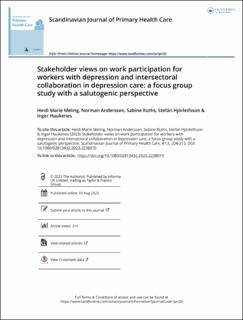| dc.contributor.author | Meling, Heidi Marie Kirkeng | |
| dc.contributor.author | Anderssen, Norman | |
| dc.contributor.author | Ruths, Sabine | |
| dc.contributor.author | Hjørleifsson, Stefan | |
| dc.contributor.author | Haukenes, Inger | |
| dc.date.accessioned | 2023-10-03T12:35:36Z | |
| dc.date.available | 2023-10-03T12:35:36Z | |
| dc.date.created | 2023-09-29T14:35:58Z | |
| dc.date.issued | 2023 | |
| dc.identifier.citation | Scandinavian Journal of Primary Health Care. 2023, 41 (3), 204-213. | en_US |
| dc.identifier.issn | 0281-3432 | |
| dc.identifier.uri | https://hdl.handle.net/11250/3093810 | |
| dc.description.abstract | Objective: To explore how stakeholders in depression care view intersectoral collaboration and work participation for workers with depression. Design: Focus group study applying reflexive thematic analysis using a salutogenic perspective. Setting and subjects: We conducted seven focus group interviews in six different regions in Norway with 39 participants (28 women); three groups consisted of general practitioners (GPs), two of psychologists and psychiatrists and two of social welfare workers and employers (of which one group also included GPs). Results: Stakeholders considered work participation salutary for most workers with depression, given the right conditions (e.g. manageable work accommodations and accepting and inclusive workplaces). They also highlighted work as an integral source of meaningfulness to many workers with depression. Early collaborative efforts and encouraging sick-listed workers to stay connected to the workplace were considered important to avoid long and passive sickness absences. Furthermore, stakeholders’ views illuminated why intersectoral collaboration matters in depression care; individual stakeholders have limited information about a worker’s situation, but through collaboration and shared insight, especially in in-person collaborative meetings, they (and the worker) can gain a shared understanding of the situation, thereby enabling more optimal support. Ensuring adequate information flow for optimal and timely follow-up of workers was also emphasized. Conclusions: Stakeholders highlighted the salutary properties of work participation for workers with depression under the right conditions. Intersectoral collaboration could support these conditions by sharing insight and knowledge, building a shared understanding of the worker’s situation, assuring proper information flow, and ensuring early and timely follow-up of the worker. | en_US |
| dc.language.iso | eng | en_US |
| dc.rights | Navngivelse 4.0 Internasjonal | * |
| dc.rights.uri | http://creativecommons.org/licenses/by/4.0/deed.no | * |
| dc.title | Stakeholder views on work participation for workers with depression and intersectoral collaboration in depression care: a focus group study with a salutogenic perspective | en_US |
| dc.title.alternative | Stakeholder views on work participation for workers with depression and intersectoral collaboration in depression care: a focus group study with a salutogenic perspective | en_US |
| dc.type | Peer reviewed | en_US |
| dc.type | Journal article | en_US |
| dc.rights.holder | © 2023 The Author(s) | en_US |
| dc.description.version | publishedVersion | en_US |
| cristin.ispublished | true | |
| cristin.fulltext | original | |
| cristin.qualitycode | 1 | |
| dc.identifier.doi | 10.1080/02813432.2023.2238019 | |
| dc.identifier.cristin | 2180350 | |
| dc.source.journal | Scandinavian Journal of Primary Health Care | en_US |
| dc.source.volume | 41 | en_US |
| dc.source.issue | 3 | en_US |
| dc.source.pagenumber | 204-213 | en_US |

